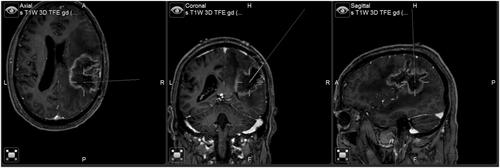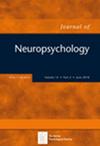保留区分左右的能力;案例研究。
IF 1.8
4区 心理学
Q2 PSYCHOLOGY
引用次数: 0
摘要
左右方位是一种与顶叶有关的功能,对许多日常活动都很重要。在这里,我们描述了一位患有右顶叶脑瘤的左撇子患者。在清醒手术中,右顶叶下叶的电刺激导致他的左右方向出现错误。术后,我们的患者在辨别左右方面没有问题。该病例报告表明,在清醒的脑瘤手术中监测左右方向是可行的,因此可以保留这一功能。本文章由计算机程序翻译,如有差异,请以英文原文为准。


Preserving the ability to discriminate between left and right; A case study
Left-right orientation, a function related to the parietal lobe, is important for many daily activities. Here, we describe a left-handed patient with a right parietal brain tumour. During awake surgery, electric stimulation of the right inferior parietal lobe resulted in mistakes in his left-right orientation. Postoperatively our patient had no problems in discriminating left right. This case report shows that monitoring of left-right orientation during awake brain tumour surgery is feasible so that this function can be preserved.
求助全文
通过发布文献求助,成功后即可免费获取论文全文。
去求助
来源期刊

Journal of Neuropsychology
医学-心理学
CiteScore
4.50
自引率
4.50%
发文量
34
审稿时长
>12 weeks
期刊介绍:
The Journal of Neuropsychology publishes original contributions to scientific knowledge in neuropsychology including:
• clinical and research studies with neurological, psychiatric and psychological patient populations in all age groups
• behavioural or pharmacological treatment regimes
• cognitive experimentation and neuroimaging
• multidisciplinary approach embracing areas such as developmental psychology, neurology, psychiatry, physiology, endocrinology, pharmacology and imaging science
The following types of paper are invited:
• papers reporting original empirical investigations
• theoretical papers; provided that these are sufficiently related to empirical data
• review articles, which need not be exhaustive, but which should give an interpretation of the state of research in a given field and, where appropriate, identify its clinical implications
• brief reports and comments
• case reports
• fast-track papers (included in the issue following acceptation) reaction and rebuttals (short reactions to publications in JNP followed by an invited rebuttal of the original authors)
• special issues.
 求助内容:
求助内容: 应助结果提醒方式:
应助结果提醒方式:


